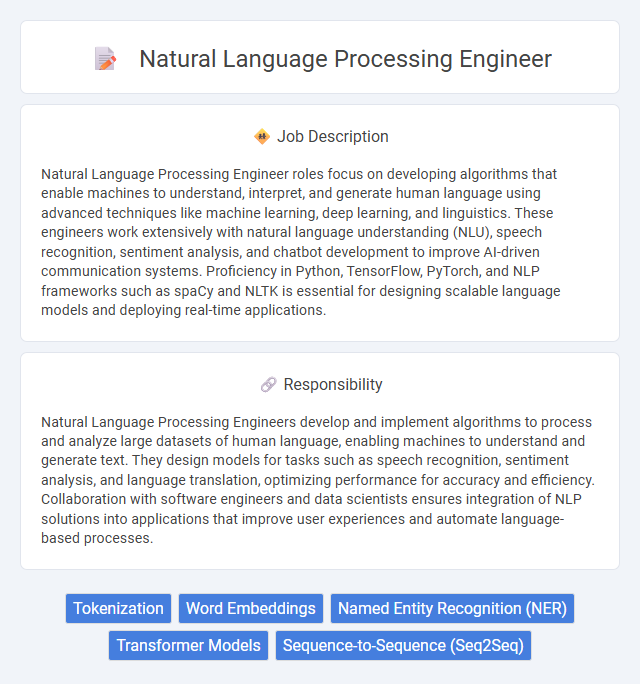
Natural Language Processing Engineer roles focus on developing algorithms that enable machines to understand, interpret, and generate human language using advanced techniques like machine learning, deep learning, and linguistics. These engineers work extensively with natural language understanding (NLU), speech recognition, sentiment analysis, and chatbot development to improve AI-driven communication systems. Proficiency in Python, TensorFlow, PyTorch, and NLP frameworks such as spaCy and NLTK is essential for designing scalable language models and deploying real-time applications.
Individuals with strong analytical skills and a passion for linguistics are likely to excel as Natural Language Processing Engineers. Those comfortable working with large datasets and machine learning algorithms may find this role well-suited to their abilities. Candidates lacking patience for iterative testing or programming might face challenges adapting to the demands of this profession.
Qualification
A Natural Language Processing (NLP) Engineer requires strong expertise in machine learning, deep learning frameworks such as TensorFlow or PyTorch, and proficiency in programming languages like Python. Advanced knowledge of linguistic theory, statistical models, and experience with NLP libraries like spaCy, NLTK, or Hugging Face Transformers are essential qualifications. A background in computer science, data science, or related fields, along with experience in developing and deploying language models, significantly enhances job qualifications.
Responsibility
Natural Language Processing Engineers develop and implement algorithms to process and analyze large datasets of human language, enabling machines to understand and generate text. They design models for tasks such as speech recognition, sentiment analysis, and language translation, optimizing performance for accuracy and efficiency. Collaboration with software engineers and data scientists ensures integration of NLP solutions into applications that improve user experiences and automate language-based processes.
Benefit
Natural Language Processing Engineer roles likely offer competitive salaries due to the specialized expertise required in linguistics and machine learning. Opportunities for working on cutting-edge AI technologies could improve career growth probabilities and skill advancement. Companies may provide flexible work arrangements and access to vast computational resources, enhancing productivity and job satisfaction chances.
Challenge
Natural Language Processing Engineer roles likely involve tackling complex challenges related to understanding and generating human language accurately across diverse contexts. Engineers probably need to optimize models for both efficiency and interpretability while managing large datasets prone to noise and ambiguity. Overcoming these obstacles often requires innovative approaches to improve language comprehension and contextual relevance in AI applications.
Career Advancement
Natural Language Processing Engineers leverage advanced algorithms and machine learning techniques to develop sophisticated language models that enhance human-computer interaction and automate text analysis. Career advancement opportunities include roles such as Senior NLP Engineer, Lead Data Scientist, or AI Research Scientist, where professionals drive innovation in speech recognition, sentiment analysis, and chatbot development. Continuous skill development in deep learning frameworks like TensorFlow and PyTorch, as well as expertise in linguistics and computational semantics, significantly increases prospects for leadership positions in tech-driven organizations.
Key Terms
Tokenization
Natural Language Processing Engineers specialize in designing and implementing tokenization algorithms that efficiently split text into meaningful units such as words, subwords, or characters. Mastery of advanced tokenization techniques like Byte Pair Encoding (BPE), WordPiece, and SentencePiece boosts the performance of language models by enhancing their ability to handle diverse linguistic structures and out-of-vocabulary words. Expertise in optimizing tokenization processes directly influences the accuracy and speed of downstream NLP tasks including text classification, sentiment analysis, and machine translation.
Word Embeddings
Natural Language Processing Engineers specialize in developing and optimizing algorithms for understanding human language, with a strong emphasis on word embeddings such as Word2Vec, GloVe, and FastText. These embeddings transform words into continuous vector representations, capturing semantic relationships and contextual nuances essential for tasks like sentiment analysis, machine translation, and text classification. Expertise in embedding techniques enhances model accuracy and efficiency in applications involving large-scale textual data processing.
Named Entity Recognition (NER)
A Natural Language Processing Engineer specializing in Named Entity Recognition (NER) develops algorithms to accurately identify and classify entities such as names, locations, dates, and organizations within unstructured text data. Expertise in machine learning frameworks like TensorFlow or PyTorch, along with proficiency in NLP libraries such as SpaCy and Stanford NER, is essential to optimize entity extraction for diverse applications. This role often involves refining models to enhance precision and recall in domains including finance, healthcare, and legal text analysis.
Transformer Models
Natural Language Processing (NLP) Engineers specializing in Transformer models design and implement advanced algorithms for language understanding and generation, leveraging architectures like BERT, GPT, and T5. Their role involves fine-tuning pre-trained Transformer models on domain-specific datasets to improve tasks such as text classification, named entity recognition, and machine translation. Mastery in frameworks like TensorFlow and PyTorch enables NLP Engineers to optimize model performance and deploy scalable AI solutions in production environments.
Sequence-to-Sequence (Seq2Seq)
Natural Language Processing Engineers specializing in Sequence-to-Sequence (Seq2Seq) models develop advanced algorithms for tasks such as machine translation, text summarization, and conversational AI. They utilize encoder-decoder architectures with attention mechanisms to process and generate human language sequences efficiently. Proficiency in deep learning frameworks like TensorFlow and PyTorch is essential for optimizing Seq2Seq performance in real-world applications.
 kuljobs.com
kuljobs.com